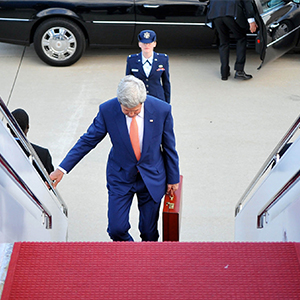
From concerns around cyber-espionage to territorial disputes in the South China Sea, this week’s Strategic and Economic Dialogue between the U.S. and China may be marked by tensions between the two nations. Despite the countries’ differences, American and Chinese diplomats should take advantage of what they have in common: the U.S. and China’s mutual interest in a peaceful Africa and the opportunity to partner to build peace.
Both countries have an interest in creating stable environments. Investing in energy and development is expensive, and an unstable government, risk to nationals or changing local power dynamic can mean lost profits, infrastructure and personal security. For both countries, Africa is an increasingly important market for goods and the U.S. also has national security interests, historical ties, and humanitarian and related concerns. Even though the U.S. and China compete for influence, resources, and economic interests on the continent, they both benefit from peace. By working together they could improve not only stability but goodwill and prosperity.
Over the past few years, China has begun to take some positive actions to support peace in Africa. The list is short, but shows a growing commitment to stability, especially to Sudan: During the 2012 Dialogue, China’s foreign minister agreed to a UN resolution to promote peace between Sudan and South Sudan, and within Sudan itself. The Chinese Special Envoy to Africa helped defuse an oil-related crisis between Sudan and South Sudan last summer. More recently, China suspended negotiations with South Sudan over an arms deal soon after fighting broke out in December, and Chinese diplomats have reportedly played a constructive role during the peace negotiations in Addis Ababa to end the ongoing conflict in South Sudan.
And now, China is sending a battalion from the People’s Liberation Army to the reinforced UN peacekeeping mission in South Sudan, the first time China will have deployed an entire battalion to any peacekeeping operation. The UN Security Council recently refocused that force’s responsibilities on protecting civilians (including foreign nationals) and helping to monitor and enforce a peace agreement between the two sides of the violent, sectarian conflict.
Of course China’s interest in Sudan and South Sudan is not simply a new commitment to international peace and security. South Sudan provides 5% of China’s oil imports and the Chinese have invested heavily in oil fields and infrastructure, and Chinese workers have come under threat in South Sudan.
Regardless of motivation, the U.S. and China each have strategic and economic interests in achieving progress towards greater stability in Africa. These joint interests begin with the crisis in Sudan and South Sudan, but can perhaps lead to more widespread efforts to prevent extractive industries from fueling conflict in the future. To this end, this year’s Dialogue should consider and agree to jointly take the following steps:
- Provide financial and necessary logistical support to the UN Mission in South Sudan and its new mandate to protect civilians, and stand up to Government of South Sudan pressure on the UN.
- Provide diplomatic support to the mediation of the African Union on Sudan, and IGAD on South Sudan, including by pressuring all the relevant actors in Sudan and South Sudan to abide by their obligations and promote peace.
- Support a revised mandate for the UN peacekeeping operation in Darfur that focuses on the protection of civilians and human rights reporting.
- Work together with other members of the international community, particularly Qatar, to ensure there is one comprehensive peace process in Sudan to address all conflicts and political disputes facing the country.
- Ensure an effective ceasefire and unimpeded humanitarian access throughout both countries, including Darfur, South Kordofan and Blue Nile in Sudan and Unity, Upper Nile and Jonglei states in South Sudan and Abyei.
- Call on all parties to show restraint in arm sales to the parties to the conflict in Sudan and South Sudan.
Continuing and broadening collaboration on Sudan and South Sudan not only holds potential for African countries, but also presents an opportunity for the U.S. and China to bolster their relationship on the continent and beyond. As leading world powers, the U.S. and China can and should work together to bring stability, peace and prosperity to a region and two countries that are in desperate need. They can start this process now.